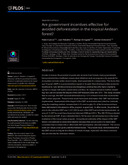| dc.description.abstract | In order to ensure the provision of goods and services from forests, many governments have promoted less-traditional conservation initiatives such as programs of payments for ecosystem services called, more broadly, direct payments for conservation. The Socio Bosque Program (SBP) is a governmental program in Ecuador that directly provides economic incentives to rural families and local and indigenous communities who have voluntarily agreed to comply with some conservation activities. An impact evaluation method (matching) was used to assess the impact of the SBP between 2008 and 2014. This study revealed that on average, the SBP reduced deforestation by 1.5% in those forests that received the SBP's direct payment. These forests would have been deforested if the SBP had not been implemented. Assessment of the impact of the SBP on individual and collective contracts, using the matching method, revealed that 3.4% and roughly 1% of the forest would have been deforested in the absence of the program, respectively. In other words, the protected area in the collective SBP was 1,247,500 ha and, if the SBP had not been implemented, an area of 11,227 ha would have been lost between 2008 and 2014. The 65,700 ha protected by the individual SBP, it was estimated that 5,733 ha were not deforested due to the implementation of the conservation program. Conventional estimates of the impact of the SBP tend to overestimate avoided deforestation because they do not control for observable covariates that correlate with or affect both SBP participation and deforestation. The conclusions are robust, even given potential hidden biases. | es_ES |


